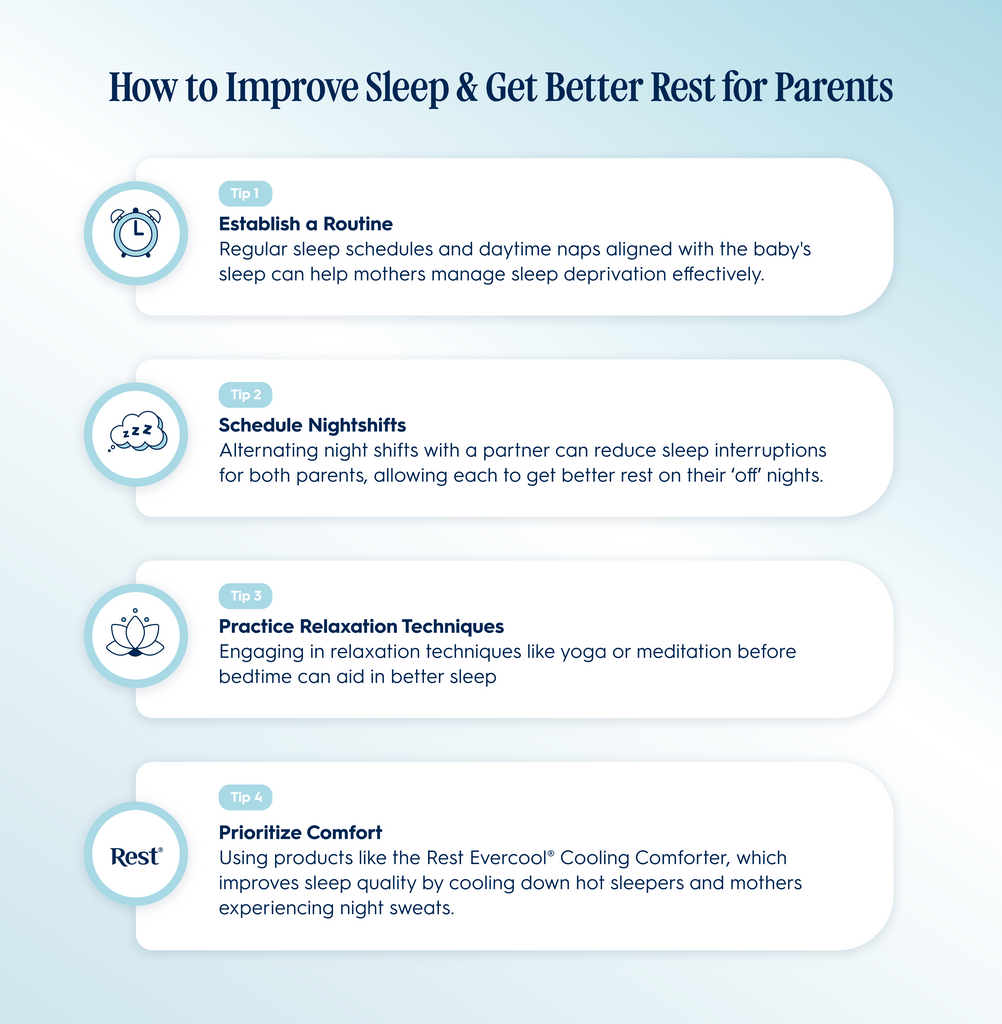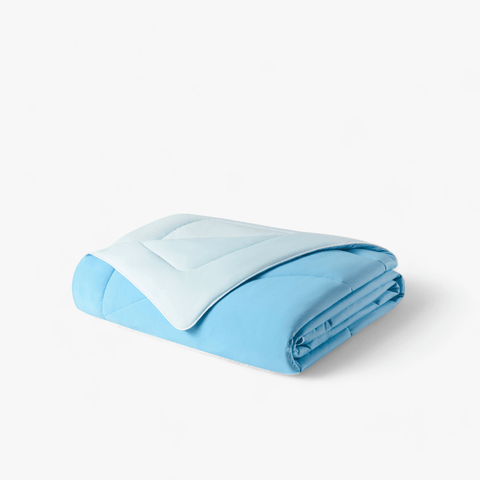Sleep Deprived Moms: Postpartum Sleep Disturbances & Lack of Rest

Better Sleep for Moms: Overcoming Sleep Fragmentation with Cooling Comforters and More
TL;DR:
Motherhood brings immense joy along with significant challenges, one of which is often a drastic reduction in sleep quality and duration. Understanding the causes of sleep issues and finding effective solutions is critical for mothers striving to regain restful nights.
How many Mothers are Sleep Deprived?
According to one study, approximately 60% of new mothers exhibited insomnia symptoms. Sleep deprivation is common among mothers, both expectant and postpartum, causing significant impacts to physical health, emotional well-being, and overall quality of life. The arrival of a baby often means that mothers must adjust to a fragmented sleep schedule, feeding every few hours, and the constant stress of new responsibilities.
Sleep satisfaction and duration declines for both parents, and would not fully recover until up to 6 years after the birth of their first child. In fact, sleep satisfaction and duration was worst during the first 3 months postpartum, with mothers most affected, likely as a result of breastfeeding. This highlights the long term effects of sleep deprivation after parenthood and necessity to implement strategies for better sleep.

How does Sleep Deprivation Affect Mothers?
Sleep deprivation for adults is linked to decreased cognitive function, mood swings, and even long-term health issues like cardiovascular diseases.
As it relates to mothers, those who had insufficient sleep were less likely to utilize positive parenting with their children. Maternal insomnia can also cause more household chaos and child neglect, with sleep problems affecting the wider family and interfamilial relationships.
A majority of women (59%) say they do more household chores and around three-quarters (74%) of mothers say they do more to manage their children’s schedules and activities than their spouse or partner. Social expectations and responsibilities for women and mothers as primary caregivers to shoulder disproportionately more household labour leads to fragmented sleep.
Fragmented sleep is characterized by short, repeated interruptions to sleep, impairing the restorative effects of sleep and causes excessive daytime sleepiness. This chronic poor quality of sleep adversely affect parents’ ability to meet childrearing demands, such as unsafe sleep practices, less likely to use a car seat, or more likely to use emergency rooms.
Postpartum Insomnia and Mental Health of Mothers
Chronic sleep deprivation can severely impact a mother's mental health. Sleep deprivation and factors affecting sleep during the postpartum period such as physical changes and demands from the infant, may lead to chronic insomnia. As a result, mothers are more likely to develop postpartum depression and anxiety, with research estimating that 13% of mothers in the postpartum period experience depression.
It is important to identify maternal depression and seek treatment to minimize its negative effects on both the mother and child. In some cases, depression in the mother may also affect the child’s cognitive, emotional and social development. In the case of newborns, women suffering from depression are less likely to breastfeed, potentially leading to poor infant growth.
Can you Recover from Years of Sleep Deprivation?
Sleep deprivation is very common, with everyone suffering from it at some point in time. However, issues can occur when sleep deprivation continues beyond weeks and months. As is the case with childbirth, mothers may experience months of postpartum sleep deprivation. That said, it is possible to recover from sleep deprivation, but typically requires sustained changes to sleep habits and routines.
While lost sleep due to chronic sleep deprivation cannot be fully "recovered" in a simple one-to-one sense, improving sleep consistency and duration can help restore some of the cognitive and health deficits caused by long-term sleep loss. Effective recovery strategies requires individuals to prioritize sleep and address any underlying issues contributing to poor sleep quality.
How to Improve Sleep & Get Better Rest for Parents

1. Establish a Routine: Consistency is key in improving sleep quality. Mothers should try to go to bed and wake up at the same time every day to regulate their body clocks. While it might be challenging with a newborn, taking short naps during the day when the baby is also sleeping can help alleviate sleep deficits.
2. Schedule Nightshifts: Sharing nighttime parenting responsibilities with your partner can greatly reduce individual burden. Rather than both parents waking up during their baby’s night time awakenings, set up a shift schedule for only one parent to tend while the other can continue sleeping.
3. Create a Sleep-Conducive Environment: The bedroom environment significantly affects sleep quality. Keeping the room cool, dark, and quiet can make a big difference. Investing in cooling bed sheets or the best cooling comforter for hot sleepers can be particularly beneficial, especially for mothers experiencing postpartum hormonal fluctuations that can cause night sweats.
4. Practice Relaxation Techniques: Techniques such as deep breathing, yoga, or meditation before bed can help calm the mind and prepare the body for sleep. Apps and online videos can guide mothers through these practices, making them easy to do at home.
5. Prioritize Comfort: Comfort in bed is non-negotiable for good sleep. Cooling comforters, such as those from Rest Evercool® Cooling Comforter, use innovative textiles technology to regulate temperature, making them an ideal choice for mothers who struggle with being too hot at night or may have night sweats.
While motherhood is an exciting journey, it is also a time when women are vulnerable to sleep disturbances. By establishing a good bedtime routine, creating a comfortable and cool sleeping environment with products like the Evercool® Cooling Comforter, and seeking help when needed, mothers can significantly improve their sleep quality. Remember, taking care of your sleep is not just about personal health; it’s about being the best you can be for your baby.









